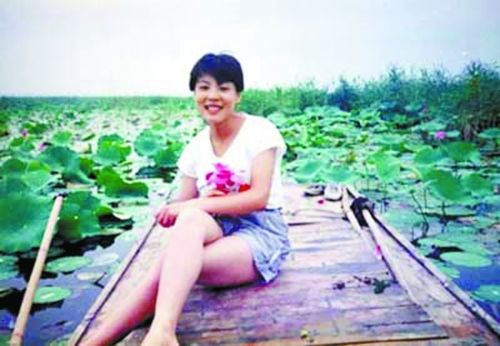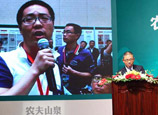
 |
| Zhu Ling was an energetic, smart young woman before the poisoning incident. (China Daily) |
Haipei Xue, president of the National Council of Chinese Americans, said he believed most of the signatures may have come from Chinese citizens, but he emphasized that the White House website is designed to serve US nationals.
"I don't think the process is appropriate," he said. "Chinese Internet users should seek answers from the Chinese government first."
Zhang Jie, Zhu Ling's lawyer and a senior partner at Beijing Litian Law Office, said that although he appreciated the sincerity of the opinions aired, posting a petition on the website of a foreign government is not the right way to seek help.
"Zhu Ling's case is still under the provenance of Chinese law, and I object to the use of these channels to ask a foreign power to intervene in Chinese domestic justice," he said.
However, some observers said the fevered online reaction indicated a widespread desire for retribution and that Sun has become a focal point for the disaffected.
The rumor that Sun comes from the family of a senior official can be seen as a manifestation of public anger against the wealthy and privileged, according to Lin Guirui, a psychology professor at the Capital Normal University.
"It is similar to a case at a university in Hebei province a few years ago. A student killed a pedestrian while driving recklessly. When onlookers attempted to detain him, the student made threats and informed them that his father was Li Gang, an official at the local public security bureau," said Lin. "In reality, it was just a car accident, but it triggered a huge public outcry, prompted by an intense dislike of privilege and wealth."
One of the reasons that the Zhu case has attracted so much attention from the public and the media is that it is still unsolved, she added. "From a psychological point of view, the uncertainty produces greater instability than incidents that are resolved."
What's more, the incident changed Zhu's life irrevocably, ruining her promising future and causing huge damage to her health. People tend to sympathize with the weak, and Zhu's current poor health has won her a great deal of support, said Lin.
The petitioners' behavior and the reaction it provoked shows why public sentiment should never take the place of the law, said Dong Yan, an assistant professor at Renmin University of China's psychology department.
She regarded the petition as a form of "herd behavior" on the Internet: "Of the 130,000 people who signed the petition, many may have simply been following a trend. It is certain that their sensational reaction has overtaken their rationality."
Zheng Zaisuo, a senior lawyer at Zhong Yin Law Firm in Beijing, said the petition and subsequent furor illustrated that the power of social media is a double-edged sword. It drew public attention to Zhu's case, which had been overlooked for nearly two decades, but at the same time stirred up irrational emotions.
"Online bulletin board sites and weibo (social networking sites) are flooded with rumors, angry comments and curses," he said. "These angry people think they are protecting one person's rights, but they may be harming another's rights at the same time. It is the law, not people's emotions, that convicts a criminal."
"If you advocate reinvestigating a case and that unearths the culprit, you are a responsible citizen, but if you accuse Sun of murder without evidence, and call for revenge, you are just one of the mob," said Zheng.
A personal statement
Despite the time lag, online interest in Zhu's case has never quite abated. The issue was reignited by an unrelated incident at Shanghai's Fudan University, when a postgraduate student, Huang Yang, died in April after being poisoned with the highly toxic chemical N-Nitrosodimethylamine. One of Huang's roommates was subsequently charged with his murder.
On Tuesday, Yao Chen, a popular Chinese actress, posted a story to her 45 million followers on the micro-blogging website Sina Weibo claiming that Zhu's mother had declined an interview with the New York Times Chinese language website. The post has been forwarded more than 1,700 times and attracted more than 1,000 comments in the space of 30 minutes.
On Dec 30, 2005, 10 years after the incident, Sun posted a message titled "Sun Wei's statement: Refuting the rumor that I poisoned my roommate Zhu Ling" on the forum of one of China's biggest bulletin board sites, Tianya.
In the statement, Sun, who now lives in the US, denied any involvement in the case and said the adverse publicity and allegations have made her a victim too. She also complained that her name is still on the police department records with regard to the incident.
The post gained 1.5 million hits and many readers left comments. Sun didn't reply to each and every comment, but she did say she had never been in conflict with her former roommate and had no reason to harm her.
On April 18, Sun posted a second, much shorter statement, saying that she lived a lonely but contented life and cared little about either positive or negative public opinion. The post received more than 6 million hits and 225,000 comments.
"I understand why people are so angry about this case. Many think it confirms a widespread belief that officials are above the law," said Zheng Zaisuo, referring to the allegations of an official coverup. "But people need to be rational. What we need is a rigorous legal system and an objective investigation, not mob revenge against Sun."
Zheng said it is unfair and inappropriate to call Sun a poisoner or a criminal, because she has never been formally charged in connection with the case.
"Zhu and her family have surely suffered, and they deserve sympathy and support. But Sun's rights deserve respect as well," he said. "There are still a lot of questions about Zhu's case that have never been answered. We should ask for more information and further investigation of the case, but blame should not be apportioned before the case is solved."
Zhang Jie, Zhu's lawyer, said he applied to the police to publicly disclose their findings on the case, but the application was rejected. He said greater transparency is urgently needed.
Zheng said it's possible that the investigation could be resumed because the two-decade-old case has attracted so much recent attention.
"It is time for authorities to make an official statement on what will happen next. You can't cover anything up in the era of social media, so it's better to be forthright from the outset," he said.
"An independent committee, including legal experts, should supervise the investigation. Otherwise, people will never be convinced."
Chen Jia in San Francisco contributed to this story.



















![]()
